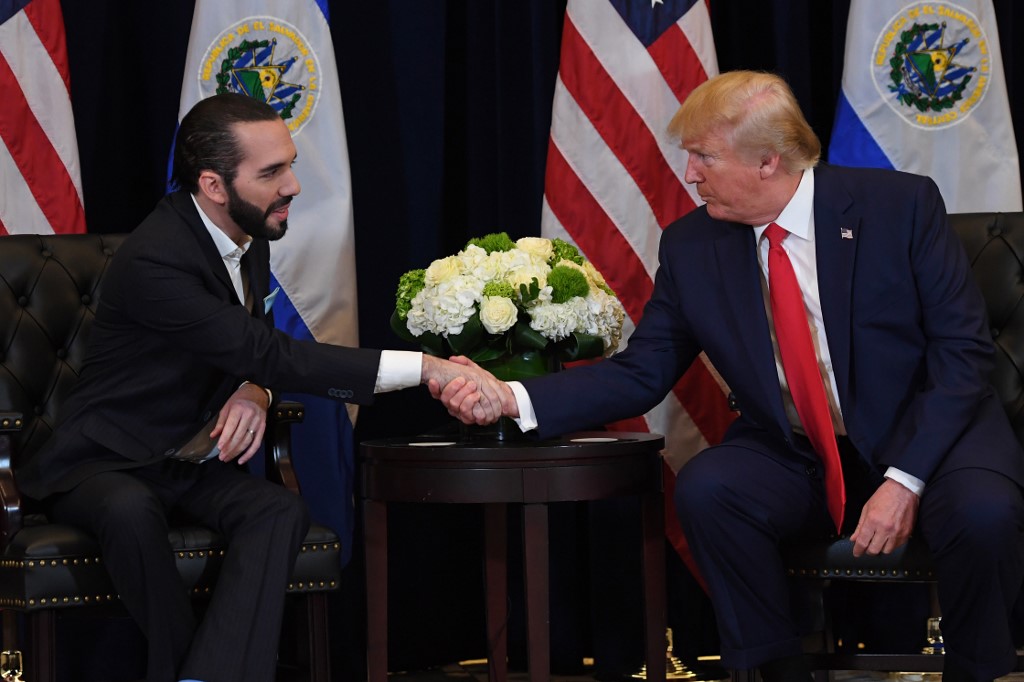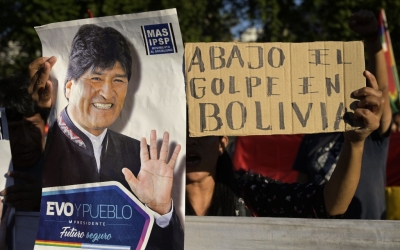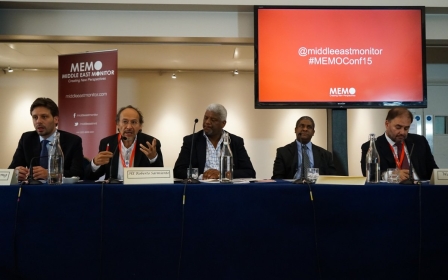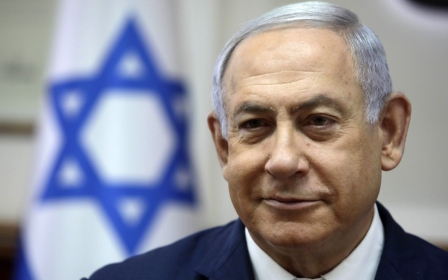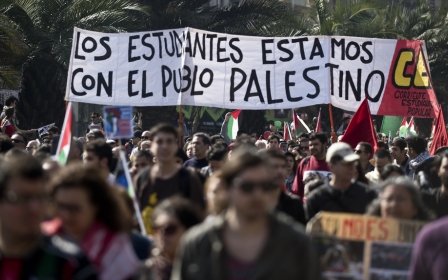Israel and El Salvador: Love in a time of genocide

In January 2016, Israel’s Ynet news site reported that El Salvador was threatening to close its embassy in Tel Aviv and move it to Ramallah in the occupied West Bank.
The threatened relocation had nothing to do with solidarity with Palestine; according to Ynet, the Salvadorans were simply furious that Israel had decided to cut back on costs by closing its embassy in San Salvador and were seeking retaliation.
El Salvador denied the report, and the embassy stayed put in Tel Aviv - where, it bears mentioning, it had been moved from Jerusalem only a decade before. In fact, for a brief spell in 2006, El Salvador was the only country in the world with an embassy in Jerusalem. Call it pre-trumping Trump.
A serious Israel problem
The Israelis were probably correct in calculating that they don’t actually require a diplomatic presence in El Salvador, since the country is pretty much “in the bag”. (Thankfully, the former embassy website is still active and boasts an educational video in Spanish about important Israeli achievements, such as a ban on the use of “underweight models”. Underweight Gazans, on the other hand, are apparently fine - as are regular Israeli military massacres of Palestinian civilians.)
New MEE newsletter: Jerusalem Dispatch
Sign up to get the latest insights and analysis on Israel-Palestine, alongside Turkey Unpacked and other MEE newsletters
I myself am currently in San Salvador, and can safely say that, when you start seeing Stars of David everywhere and even windshields of pharmacy vans emblazoned with slogans such as “Almighty One of Israel” - in a country with an estimated Jewish population of 150 individuals - you know you’re in a place with a serious Israel problem.
It abstained from the 1947 UN vote on partition - and yet was the first of the abstaining countries to recognise Israel
It’s particularly ironic given the sizeable Palestinian community in El Salvador, mostly immigrants from Bethlehem who began arriving in the late 19th century. Now, there are more Palestinians in El Salvador than in Bethlehem itself - including the country’s new president, Nayib Bukele, a distinctly nauseating character who thinks US President Donald Trump is “very nice and cool,” despite Trump’s classification of El Salvador as a “sh**-hole country”.
In February 2018, Bukele - then mayor of San Salvador - travelled to Israel on an Israeli government-sponsored trip to attend a conference on “security” and other matters. There, he was able to partake in charming photo ops with then-mayor of Jerusalem Nir Barkat of the ultra-right Likud party, and to otherwise pull at social media heartstrings.
Decades-long love affair
But the Salvadoran-Israeli love affair goes back decades. While El Salvador has not attained the same extreme bootlicker status as other diminutive nations, such as Palau - in terms of votes at the United Nations in support of Israel’s barbarity - it does often conveniently abstain from voting. As it so happens, it abstained from the 1947 UN vote on partition - and yet was the first of the abstaining countries to recognise Israel.
Israel also has a soft spot for El Salvador owing to Jose Arturo Castellanos, a Salvadoran diplomat in Europe who saved thousands of Jews during World War II by providing them with certificates of Salvadoran citizenship.
This, incidentally, was during the dictatorship of Salvadoran general Maximiliano Hernandez Martinez, who had recently taken it upon himself to slaughter tens of thousands of mainly indigenous peasants in El Salvador - themselves historical victims of land theft and brutal oppression by the country’s ruling elite.
In other words, stuff that would soon sound all too familiar to Palestinians.
According to Haaretz, the story of the great Castellanos rescue only came to light in 1974, when El Salvador “hosted a beauty pageant” and one of the judges, writer Leon Uris, requested to meet with the ex-diplomat. Actually, the year was 1975, and the beauty pageant was the Miss Universe competition - which ended up setting yet another stage for bloodshed.
As former New York Times correspondent Raymond Bonner notes in his book Weakness and Deceit: America and El Salvador’s Dirty War, demonstrations against the government’s decision to squander at least $1m on the pageant - in a country of obscene poverty and inequality - were fiercely repressed. Then, “when 3,000 students marched through the streets of the capital to protest the repression … soldiers fired on them with machine guns and automatic rifles, killing at least 12”.
'Scorched earth' policies
Which brings us to Israel’s role in arming right-wing forces in El Salvador. A recent Al Jazeera video reminds us that, from 1975 to 1979 - the runup to the 12-year Salvadoran civil war - “83 percent of El Salvador’s military imports came from Israel”.
Furthermore, Israelis “helped train ANSESAL, the secret police that would lay the foundation for death squads” during the war - during which at least 75,000 people perished. The vast majority of lethal violence was committed by the state and allied paramilitary groups and death squads.
In its report titled “Israel’s Worldwide Role in Repression,” the International Jewish Anti-Zionist Network documents how Israel not only provided weapons and counterinsurgency training to the maniacal Salvadoran right-wing, but also “helped plan and implement ‘scorched earth’ policies”.
Israel’s national labour federation, meanwhile, collaborated with the CIA and AFL-CIO “to undermine rural cooperatives”. Of course, much of the right-wing terror in wartime El Salvador was made possible by Israel’s BFF, the United States.
So why, then, is El Salvador plagued by such a level of Israelophilia - especially in light of the significant Palestinian population?
Much of the popular displays of affinity - such as the “Almighty One of Israel” pharmacy vans - have to do, obviously, with religious-biblical reasons and not political ones. But the problem is that, when it comes to the genocidally oriented state of Israel, nothing is nonpolitical.
Another factor to consider is that many of the Palestinian immigrants to El Salvador belong to the upper echelons of society. Adrienne Pine, an anthropologist at American University in Washington and an expert on Latin America, remarked to me that Central American Palestinian elites have a “long, complex relationship with Israel”. As Palestinians, she said, “they have stood alongside their ancestral communities in their fight for liberation and to end Israeli apartheid”.
But “as capitalists,” she continued, “they - like their elite non-Palestinian counterparts - have seen the clear benefit of allying with Israel in training and supplying their security forces to help implement dramatically unpopular neoliberal policies at home”.
From Palestine Plaza to Israel Plaza
To be sure, Palestine has a presence - at least ornamentally - in El Salvador. The other day in the capital, I went to visit Yasser Arafat Plaza, which was somewhat difficult to locate since “plaza” is an overstatement; it might have been more aptly called “Random Roadside Bust of Yasser Arafat”.
There’s also a Palestine Plaza, a Salvadoran Arab Club, and a Palestinian embassy. Granted, no one I spoke with in the vicinity of Yasser Arafat Plaza knew who Yasser Arafat was.
Mercifully, not everyone remains under the Zionist spell
Not far from Palestine Plaza, however, is Israel Plaza, and in the Salvadoran city of San Miguel, there is not only a State of Israel Plaza but also a Menachem Begin Avenue - named for the former Israeli prime minister who oversaw, among countless other nefarious activities, the 1982 invasion of Lebanon that killed some 20,000 Lebanese and Palestinians, the majority of them civilians. And then there are those pharmacy vans - and all the other myriad surfaces adorned with Israel-centric symbolism.
Mercifully, not everyone remains under the Zionist spell. One Salvadoran woman recounted to me how her mother had gone on a religious pilgrimage to Israel with no preconceived political notions, only to be horrified at the treatment of Palestinians and to enter into an existential crisis of sorts.
But this sort of awakening seems to be the exception to the norm, and, as this tiny Central American country continues to be seduced by a tiny apartheid country on the other side of the world, a quote from 19th-century Russian anarchist Mikhail Bakunin comes to mind: “Beware of small states.”
The views expressed in this article belong to the author and do not necessarily reflect the editorial policy of Middle East Eye.
This article is available in French on Middle East Eye French edition.
Middle East Eye delivers independent and unrivalled coverage and analysis of the Middle East, North Africa and beyond. To learn more about republishing this content and the associated fees, please fill out this form. More about MEE can be found here.



